12 start with P start with P

Are American political parties on the way out? Political action committees (PACs) currently compete with parties for influence over candidates and voters; persuading a more independent and volatile electorate requires new tactics; technological innovations afford more sophisticated means to appeal for support. Many political observers express doubts about the ability of political parties to adapt to these changes and to survive, but Paul Herrnson instead suggests their survival and resurgence in this balanced assessment of party activities in congressional elections.
Drawing on extensive interviews and survey data collected from nearly five hundred recent House and Senate candidates, campaign advisers, party officials, PAC executives, and journalists, Herrnson evaluates the roles of the national parties. He finds that from the perspective of party executives, they provide important campaign services and function as the key brokers between candidates, PACs, and other campaigners. For PAC officials, the national parties serve as important sources of strategic campaign information and cues for decision-making. For the candidates themselves, their parties function as appendages and accessories to their own campaign organizations.
Herrnson provides rich detail on party development and party campaign activity to predict the future of congressional elections and of the party-in-government and the party-in-the-electorate. Political practitioners as well as scholars will welcome this fresh, new contribution to a significant political controversy.

Modern legislators are increasingly motivated to serve their constituents in personal ways. Representatives act like ultimate ombudsmen: they keep in close touch with their constituents and try to cultivate a relationship with them based on service and accessibility. The Personal Vote describes the behavior of representatives in the United States and Great Britain and the response of their constituents as well. It shows how congressmen and members of Parliament earn personalized support and how this attenuates their ties to national leaders and parties.
The larger significance of this empirical work arises from its implications for the structure of legislative institutions and the nature of legislative action. Personalized electoral support correlates with decentralized governing institutions and special-interest policy making. Such systems tend to inconsistency and stalemate. The United States illustrates a mature case of this development, and Britain is showing the first movements in this direction with the decline of an established two-party system, the rise of a centrist third party, greater volatility in the vote, growing backbench independence and increasing backbench pressure for committees and staff.
This book is essential for specialists in American national government, British politics, and comparative legislatures and comparative parties.

In this study of Miles Poindexter, Insurgent Republican turned conservative, Howard W. Allen reaches beyond the traditional bounds of biography to present a history of the United States Congress during the Progressive era and the early years after World War I.
A congressman (1909–13)and a senator (1913–23), Miles Poindexter of Washington State was an outspoken, progressive reformer before World War I. He struggled to protect “the people” from “special interests,” particularly defending the interest of his section against eastern “colonialism.” A man with a penchant for absolute positions, Poindexter became caught up in the emotionalism of the Insurgent Republican revolt. At one time or another he championed Socialists, the IWW, the striking textile workers in Lawrence, Massachusetts—all unlikely causes for a middle-class lawyer from Spokane.
Regarding foreign policy, Poindexter was an uncompromising nationalist who, with Theodore Roosevelt, declared himself a member of the Progressive party in 1912.
After 1917 Poindexter actively tried to suppress opponents of the war. Following the war his targets were “Bolshevists” and other radicals. He also developed intense hostility toward Socialists, the IWW, and organized labor, fearing radicalism and labor. Reversing his former position, he allied himself with the eastern businessmen and regular Republicans in the Senate. Campaigning for the presidency in 1920, he appealed without success to the most conservative members of the party. He was defeated b a progressive Democrat in his 1922 bid for reelection to the Senate.
Allen examines the traditional sources—archival collections, newspaper files, and congressional reports. When he combines this material with a quantitative analysis of roll-call votes throughout Senator Poindexter’s years in Congress, he creates a remarkably useful method never before attempted in political biography.
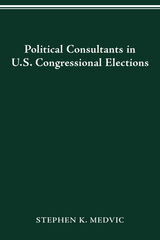
Political Consultants in U.S. Congressional Elections answers two simple questions: What do professional political consultants do? and How successful are they? Medvic analyzes the way consultants shape political dialogue and uses empirical data to show the benefits—and limits—of a consultant's involvement in a campaign. He focuses on issues as diverse as vote shares, outcomes, and fundraising. Finally, the author demonstrates how the adversarial nature of campaigns fosters the kind of electioneering advocated by most political consultants and argues that this process may not be as harmful for the country as is often suggested.
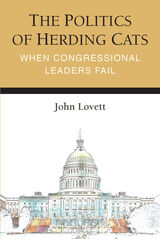
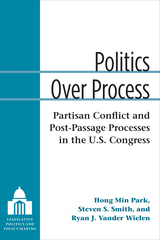
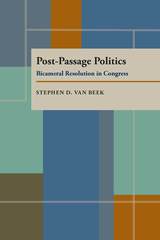
“Megabills” that package scores of legislative proposals into House and Senate bills are a phenomenon of the congressional reforms of the 1970s and the agenda changes of the 1980s. These bills generate unprecedented disagreements between the House and Senate, requiring congressional leaders, the president, committee chairs, and junior members to play new roles in this struggle for resolution.
Conference committees of hundreds of members, informal negotiations among party leaders, and preconference strategizing and behavior are among the new realities of bicameralism that are viewed in this study. These conferences are vital because they generally are the last arenas in which large-scale changes can be made in legislation.
Van Beek uses a case study approach that investigates the legislative histories of recent bills on the savings and loan bailout, the major trade bill of the late 1980s, and several budget reconciliation bills. His research is brought to life through personal experience as a legislative aide, direct observation of Congress at work, and interviews with members, staff and lobbyists.


In the wake of the Clinton-Lewinsky scandal, the Christian Right expected major victories in the 1998 elections. Instead, many of its allies lost close contests, and the movement was seen as a liability in some high-profile campaigns. In the only in-depth study of the Christian Right's role in these races, leading scholars analyze the role of the movement in fourteen key states, from Maine to California, and address speculations that the movement is fading from the American political scene.
The book focuses on elections on the state and local levels, where the Christian Right is most influential, and it describes the movement's niche in some detail. Although each campaign described in the book had its unique characteristics, the editors have drawn some broad conclusions about the 1998 elections. While the movement was weak in the areas of candidate recruitment and fundraising, they say, the outcome may have also been related to external factors including a broader turnout of typically Democratic constituencies and the country's boredom with the scandal that conservatives had made the centerpiece of their campaign. Despite the setbacks of 1998, the contributors argue, the Christian Right continues to have an enormous influence on the political dialogue of the country.
Written from an unbiased, nonpartisan perspective, this volume sheds light on a topic that is too frequently mired in controversy.
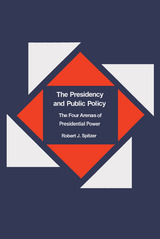
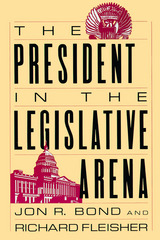
In The President in the Legislative Arena, Jon R. Bond and Richard Fleisher depart dramatically from the concern with presidential influence that has dominated research on presidential-congressional relations for the past thirty years. Of the many possible factors involved in presidential success, those beyond presidential control have long been deemed unworthy of study. Bond and Fleisher disagree. Turning to democratic theory, they insist that it is vitally important to understand the conditions under which the executive brance prevails, regardless of the source of that success. Accordingly, they provide a thorough and unprecedented analysis of presidential success on congressional roll-call votes from 1953 through 1984. Their research demonstrates that the degree of cooperation between the two branches is much more systematically linked to the partisan and ideological makeup of Congress than to the president's bargaining ability and popularity. Thus the composition of Congress "inherited" by the president is the single most significant determinant of the success or failure of the executive branch.
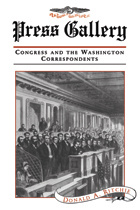
READERS
Browse our collection.
PUBLISHERS
See BiblioVault's publisher services.
STUDENT SERVICES
Files for college accessibility offices.
UChicago Accessibility Resources
home | accessibility | search | about | contact us
BiblioVault ® 2001 - 2024
The University of Chicago Press









